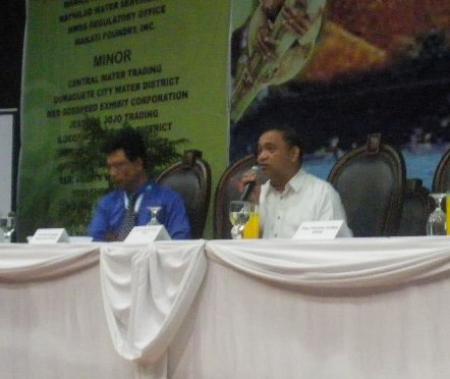The World Health Organization (WHO) has adopted the Water Safety Plan (WSP) of Maynilad Water Services, Inc. as model for other water districts in 31 countries in developing their own WSPs.
The Maynilad WSP, which details the company’s programs and procedures in ensuring the safety of water supplied to customers and corrective actions in case of water contamination, has been cited as best practice WSP in the WHO Guidelines for Drinking Water Quality. The health agency also made the Maynilad WSP as illustrative case study in the recently published WHO Training Workbook on Water Safety Plans in Urban Systems.
The WHO workbook is being distributed in countries comprising the Western Pacific Region to facilitate the formulation of WSPs by water districts. The promotion of WSPs is part of WHO’s program to address the worldwide prevalence of water-borne diseases such as diarrhea, cholera and typhoid due to poor water, sanitation and hygiene in urban communities.
According to Maynilad Environment Management Head Francisco Arellano, the Department of Health is now using the Maynilad WSP as reference for water providers in the Philippines. Maynilad is currently working with 121 local water districts in the formulation of their own WSPs.
The Maynilad WSP was developed by a multi-disciplinary team formed in 2006 with representatives from the different operations group of the company such as water sources, water treatment, groundwater and distribution. “We made sure that we have a Water Safety Plan that covers all phases of our operations — from water collection, treatment, up to the end of the pipeline,†Arellano said.
The Maynilad WSP also contains hazard analysis, risk assessment, and control measures in containing or removing water contamination brought by landslides, clogging of tunnels, El Niño, chemical forest fire, illegal logging, and security threats such as terrorist sabotage.
The Maynilad WSP was also lauded by Australian Agency for International Development and the World Bank as one of the most comprehensive WSPs in the world.
“The Maynilad WSP is a testament to our commitment to provide our customers with potable water of the highest quality,†Arellano added.
Maynilad is the private water concessionaire for the West Zone of the Greater Manila Area covering the cities of Manila (all but portions of San Andres & Sta Ana), Quezon City (west of San Juan River, West Avenue, EDSA, Congressional, Mindanao Avenue, the northern part starting from the Districts of the Holy Spirit & Batasan Hills), Makati (west of South Super Hi-way), Caloocan, Pasay, Paranaque, Las Pinas, Muntinlupa, Valenzuela, Navotas, Malabon and Cavite City, the towns of Bacoor, Imus, Kawit, Noveleta and Rosario in Cavite province. It is the largest water concessionaire in the country in terms of customer base.
Photo caption: Maynilad Environment Management Head and Maynilad Water Safety Plan (WSP) proponent Francisco Arellano presents the Maynilad WSP during the Philwater International Convention in Bohol last October. Arellano also served as resource person on WSP in a training workshop held in Singapore attended by university professors from Southeast Asia.


